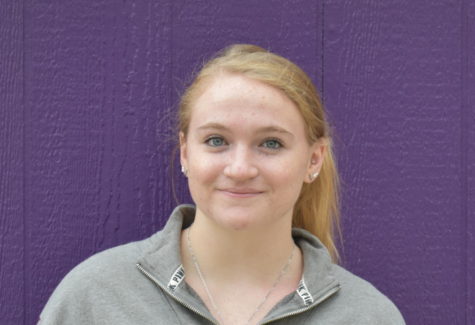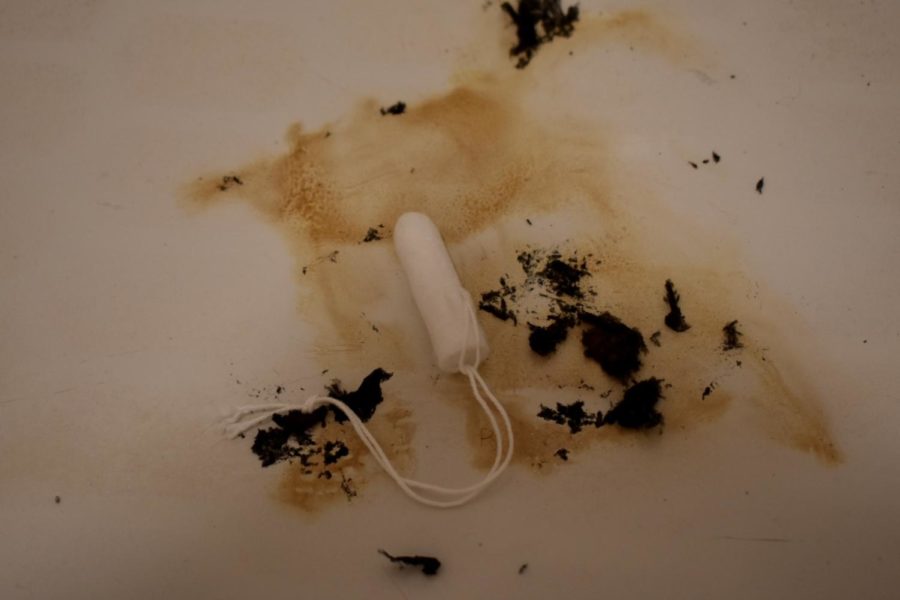What’s been going on in A-West bathrooms
Vandalism in A-West reduces needed period products to smoke on the wind.
Following a summer of fundraising in 2019, the International Feminist Club (IFC) at A-West had raised enough funds to provide three menstrual product dispensers, and the pads and tampons to go in them, for bathrooms around the school. The club had decided to devote their summer to this practice because they believed students should be able to go about their day despite being on their period, and should have access to the products necessary to do so. The product dispensers and products themselves were finally installed during the winter break of the 2019-2020 school year.
Julia Trujillo, a founder and co-president of the IFC says, “ When we started the club a lot of us had these shared experiences of just being a kid and being forgetful and unprepared at times and not having a period product and how that was such a big ordeal and some of us would just leave school.”
The situation detailed by Trujillo is a shockingly common experience. A student may forget their bag at home, or their period may come early, or any number of situations but they find themselves sitting in class hoping they are not bleeding through their pants. In this nightmarish situation, that person can either go up to their teacher, explain what’s going on, leave class, go all the way down to the nurse, explain what’s going on again, and finally ask for a pad, or they can try to make a makeshift product out of toilet paper, or they can just go home.
Kerrie Dallman, a teacher at A-West, explains, “There were kids who didn’t feel comfortable going to the school nurse and asking for a pad so they would just leave school and miss class and obviously that has a detrimental impact on students grades”
The IFC found a way to combat this, and address the glaring issue of period poverty and those affected by it A-West. Period Poverty is defined by Medical News Today as “the social, economic, political and cultural barriers to menstrual products, education, and sanitation.”
Many experiencing poverty do not have the funds to afford a box of period products. Products that allow people to continue day to day life through a menstruation cycle. When someone doesn’t have a product, they’re usually forced to leave work or school because of an inherent lack of resources.
The IFC was able to provide the needed products for those experiencing period poverty at A-West, and allow wiggle room for basic teenage forgetfulness. However, a few months after the product dispensers and products were installed in bathrooms, the world shut down in the COVID-19 pandemic. For the next few years students weren’t in the building to utilize these products.
Now, two years later, students return to classrooms and have to shoulder the additional stress of a pandemic to everything else students should in high schools. The forgetfulness, or stress of being in period poverty have just been heightened in light of mask mandates and myriad of contentions from COVID. Yet, despite these added challenges, the period products in bathrooms are under threat.
Dallman explains, “We’ve been told to no longer stock the products, and that is because someone, particular in the rest room across from the library, pulled out products, dipped pads in water and stuck them to the ceilings walls et cetera, which is concerning”
Anyone that’s gone into one of the restrooms that dispenses these products may have noticed a stray tampon plastered to the ceiling or a pad dripping water down a wall. This was a trend back in the spring of 2020 but according to Trujillo, it quickly died out. This trend has come roaring back, and is substantially worse now than it was initially.
Geree Santarelli explains, “We continued to have issues with the bathrooms over there, so we removed them from the lower west.”
Complimentary menstrual products are a necessity to reach and maintain menstrual health in our school. The Global Menstrual Collective defines menstrual health as “a state of complete physical, mental, and social well-being” a state that, without the products previously held in A-West bathrooms, will be much harder to attain.
Santarelli adds, “I have a firm belief that you get what you tolerate and if you are trashing the bathroom and wasting tons of this product, do I waste that or say go down to the clinic and hopefully we can put them back in and try again”.
Currently, the actions of a few students at A-West have begun to harm their fellow peers by inadvertently denying them access to a resource that’s as necessary as toilet paper or soap. Moreover, the trend of vandalism in bathrooms doesn’t end there. In a story detailing the proliferation of disrespect among the student body, writer Alex Larson states, “After nearly two years of wonky schedules, isolation and all things pandemic, A-West has seen a severe deterioration in student behavior.”
Schools all across the country are struggling with obedience and disrespect issues, especially among underclassmen. Santarelli mentions administration, “Just had a discussion with the sophomore class leadership. We talked about why we continue to have these issues, a lot of it is our sophomore group and a lot of it is that they were not normed to high school.”
The rub comes when this general tomfoolery begins to harm other students. When the administration is forced to just remove these products because of student action, it doesn’t actually harm the administration. Other than causing headaches and dealing with the fall out, the main people being targeted are the students who rely on period products and now are at a disadvantage and more likely to miss school.
Santarelli beseeches students to, “Have some empathy. You may think this is funny, but what about the girl that gets in there and needs a product right then.”
However, the issues aren’t generated from all students. A-West Sophomore Briana Topete says, “I feel like we’re high school students, we’re almost adults and we’re being so immature and disrespectful.”
Most students at A-West recognize this behavior for what it is, stupid and immature. Topete adds, “Grow up. These products are a privilege. There are people who actually have to use them because they don’t have them at home. You’re taking away their opportunity to be healthy.”
There is hope to reinstate the period products however. According to Santarelli, student behavior has already improved, so despite the challenges from this year, the student body can still look to the future with hope and optimism.

Jess is a senior at Arvada West and is a captain of the cheer team, the secretary of the debate team, and is involved in Purple Prose (the literary magazine),...



